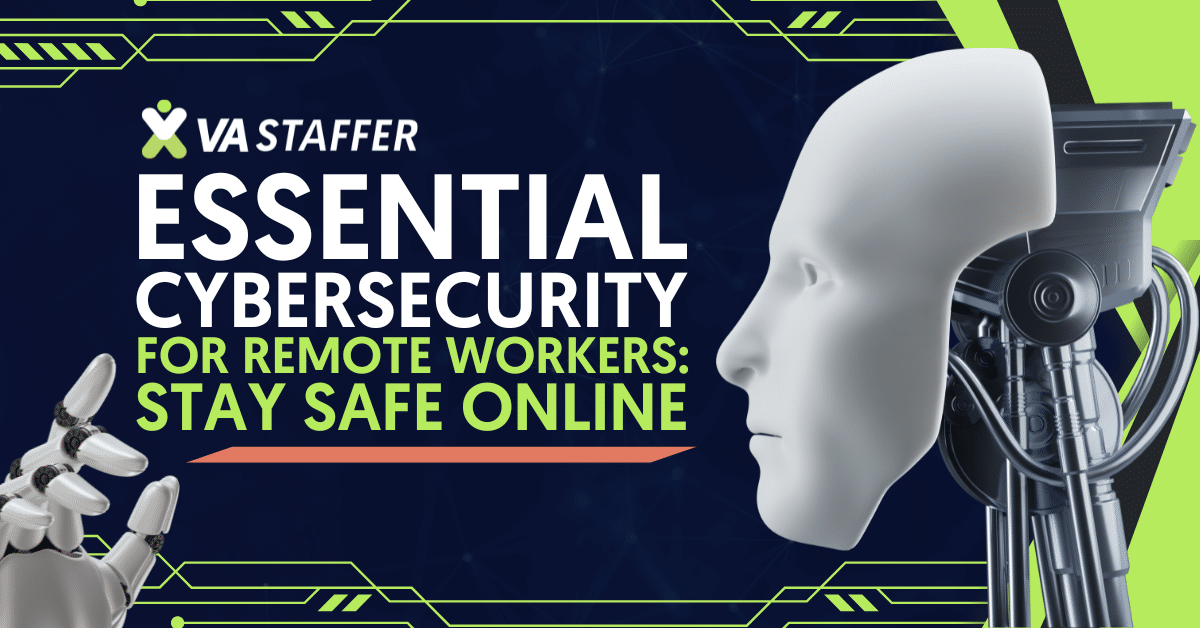With the shift to remote work, cybersecurity for remote workers has never been more critical. At VA Staffer, we’re keenly aware of the changing terrain and stand ready to shepherd you in fortifying your online work environment.
Discover the ropes in maneuvering through the heightened wave of cyber threats accompanying remote work environments. We’ll dive into essential security tips ranging from implementing robust antivirus solutions to ensuring secure network access with VPNs that will help you even if you only have a small online business.
We also cover how to safeguard personal devices and strengthen Wi-Fi security at home. By integrating these strategies, you’re taking a big step towards shielding yourself from prevalent threats bolstering your digital defense mechanisms, and ensuring cybersecurity for remote workers and your business..
Table Of Contents:
- The Surge in Cybersecurity Threats Amidst Remote Working
- Implementing Robust Antivirus Solutions
- Strengthening Wi-Fi Security at Home
- Securing Personal Devices for Remote Work
- Ensuring Secure Network Access with VPNs
- Email Security Best Practices
- Password Management and Multifactor Authentication
- Wireless Network Security Measures
- FAQs about Cybersecurity for Remote Workers
- Conclusion
- The Surge in Cybersecurity Threats Amidst Remote Working
- Implementing Robust Antivirus Solutions
- Strengthening Wi-Fi Security at Home
- Securing Personal Devices for Remote Work
- Ensuring Secure Network Access with VPNs
- Email Security Best Practices
- Password Management and Multifactor Authentication
- Wireless Network Security Measures
- FAQs about Cybersecurity for Remote Workers
- Conclusion
The Surge in Cybersecurity Threats Amidst Remote Working
With more employees working remotely, the landscape of cybersecurity risks has dramatically changed. Transitioning to telecommuting has led to a marked escalation in digital incursions.
The explosion in cyber incidents isn’t merely statistical; it serves as a stark reminder for both businesses and telecommuters to fortify their digital barricades. Cybercriminals are exploiting inadequate security measures, leaving sensitive data exposed to potential threats.
Identifying Common Vulnerabilities in Remote Work Setups
Inadequate internet security practices by remote workers can turn personal devices into gateways for hackers. Lacking robust antivirus software or ignoring updates leaves these devices vulnerable.
Phishing scams frequently hoodwink individuals into handing over access credentials by masquerading as reputable sources, making social media and corporate profiles prime targets. In the same vein, email inboxes are not immune to the cunning of advanced phishing schemes aiming to dupe individuals into disclosing sensitive details.
To mitigate these risks and ensure remote work security, adopting comprehensive security software is essential for protecting against malware and ransomware attacks that exploit zero-day vulnerabilities—flaws unknown even to the software maker until an attack occurs.
Implementing Robust Antivirus Solutions
In today’s remote work environment, ensuring the security of your devices is non-negotiable. Setting up an all-encompassing antivirus program is a smart move to beef up your gadget’s defense.
This level of protection guards against a wide array of cyber dangers including ransomware attacks and zero-day exploits. With most employees working remotely, it’s essential to have this kind of defense in place. Ensuring the security of both individual and corporate accounts shields them from unsanctioned intrusions.
Strengthening Wi-Fi Security at Home
A strong Wi-Fi network is the backbone of secure remote work setups. Many overlook the importance of securing their home networks which can be an open door for cybercriminals. Changing router settings to use WPA3 encryption can significantly enhance your network’s security.
Add another layer by limiting who can connect to your network through MAC address filtering. Thus, this method guarantees that only familiar gadgets can tap into the web, safeguarding against unwelcome breaches.
The surge in video conferences has also highlighted the need for secured connections during these calls to prevent unauthorized eavesdropping or data breaches during sensitive discussions.
Securing Personal Devices for Remote Work
The Risk of Using Personal Devices Unsecured
When working remotely, using personal devices without the right security measures is like leaving your front door unlocked while on vacation. It invites trouble. Cybercriminals are constantly on the lookout for easy targets, and an unsecured device can give them just that.
To keep things tight, installing reputable internet security software is a must. Like a watchful hound alerting you to danger, it growls at menaces before they even touch your electronic threshold. But don’t stop there; pairing this with a robust password manager ensures that your keys to the kingdom aren’t easily picked up or guessed by intruders.
Kaspersky Total Security, for example, offers comprehensive protection against online threats, including those sneaky zero-day attacks that exploit unknown vulnerabilities in software or systems you might use daily. Remember: cybercrime costs businesses around $1.5 trillion each year (SSL Store) —don’t let lax security make you part of that statistic.
Ensuring Secure Network Access with VPNs
The Importance of VPNs for Secure Connectivity
Navigating the digital era, the necessity to fortify network entry points is paramount. VPNs emerge as digital sentinels, safeguarding our internet confidentiality and fortification. VPNs act as a robust shield for your organization’s network, significantly hindering hackers’ attempts to pry into your private information.
Think of a VPN as a secure tunnel between your device and the internet. This tunnel keeps your online activities encrypted, which is essential when you’re accessing sensitive information remotely or using public Wi-Fi networks. The UK’s National Cybersecurity Centre advises using a VPN, highlighting its importance in safeguarding data in transit.
But why does this matter? As remote work becomes the norm, ensuring that our connections are private and secure is paramount. A breach can expose not just personal info but also confidential business data to hackers.
In a nutshell, weaving a robust VPN into your everyday routine is no longer optional; it’s vital for safeguarding the essence and privacy of our digital era.
Email Security Best Practices
Recognizing and Avoiding Phishing Scams
In today’s digital age, phishing, and email scams are a common threat to email security. These deceptive emails trick users into revealing personal information or clicking on harmful links. Recognizing these attempts is the first step toward safeguarding your data.
Phishing emails often mimic legitimate organizations but with slight email address or URL discrepancies. Sometimes, they’ll make you feel like everything’s on fire and you’ve got to move fast, without giving it a second thought. To combat this, always verify the sender’s details and hover over any links before clicking to see where they lead.
Boost your defense and that of your colleagues against these dangers by adopting safe Wi-Fi habits for every aspect of work. Making sure staff stick to reputable networks can majorly slash the chances of getting tricked by these deceptions.
The FBI’s guidance on safeguarding video meetings extends to the wider goal of fortifying digital conversations from unwelcome intrusions, underscoring the critical need for alertness within our digitally entwined work environments.
Password Management and Multifactor Authentication
Crafting Strong Passwords
Creating a strong, unique password is your first line of defense in cybersecurity. Securing your digital life with a hefty, unique password is akin to installing an unbreakable lock on the entrance to your personal data fortress.
But not just any lock will do; it must be complex and hard to crack. Think about combining letters, numbers, and symbols into something only you can remember.
Remember the advice from the US Federal Trade Commission – Online Security Tips, emphasizing how vital these strong passwords are for keeping your accounts secure.
Enhancing Security with Multifactor Authentication
Multifactor authentication (MFA) adds an extra layer of security beyond just a password. Imagine needing both a key and a fingerprint scan to open that same front door. Even if someone gets hold of your key (password), they still can’t get in without your unique fingerprint (the second factor).
This method significantly reduces the risk of unauthorized access because it combines something you know (your password) with something you have (like a phone app or hardware token). The importance of MFA cannot be overstated; as noted by experts, multifactor authentication provides crucial additional protection against intruders trying to gain access to sensitive data or networks.
Wireless Network Security Measures
Securing Your Home Wireless Network
With the shift towards remote work, safeguarding our home Wi-Fi networks is now more essential than ever. Without solid security measures in place, your Wi-Fi network can be a goldmine for cybercriminals. Cybercriminals might effortlessly tap into confidential information or seize control of your gadgets for nefarious activities.
To kick things off, make sure your network encryption is up to par. This means setting up WPA3 on your router if it’s available. Diving deeper into safeguarding your digital domain, WPA3 stands as the pinnacle of protection, significantly complicating any unwelcome attempts to infiltrate your network’s defenses.
Next up, let’s talk about changing those factory settings on your router—yes, I mean both the default username and password. Keeping these as they are practically rolling out a welcome mat for intruders because these defaults are no secret online.
Last but not least, implementing robust antivirus solutions, like Kaspersky Total Security can shield you from various online threats that target wireless networks directly or indirectly through connected devices.
Making these adjustments doesn’t just protect you; it helps keep everyone who connects to your network safe from potential cybersecurity risks that lurk around every digital corner when working remotely.
FAQs about Cybersecurity for Remote Workers
Can you do cyber security remotely?
Absolutely. With the right tools and practices, you can manage cyber security from anywhere.
Is remote working a cyber risk?
Yes, it can be. Remote work often lacks strict IT controls, upping the risk factor. You can mitigate this using the steps above and remind employees of their importance.
How can I work remotely securely?
Use strong passwords, enable multifactor authentication, and connect through VPNs to keep your data safe. Providing employees with proper cybersecurity training is a good idea.
Is it possible to be 100% secure while working remotely?
Nope. There’s always some level of risk but using best practices significantly lowers that threat. If you have any security concerns, you can hire a cybersecurity consultant.
Provide employees with proper training and information.
Conclusion
Ensuring the safety of your online environment and remote employees is essential. Cybersecurity for remote workers has been our focus, guiding you to fortify against threats and vulnerabilities that lurk online.
In this journey toward better cybersecurity practices, remember these pillars: implement, protect, and strengthen. As you venture into the realm of remote work, let these foundational principles guide your path to a secure online presence amidst its inherent hurdles.
You’re not alone in this fight against cyber threats. Armed with these methods and instruments, step into the realm of remote employment, fortified with assurance and serenity.


